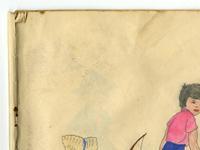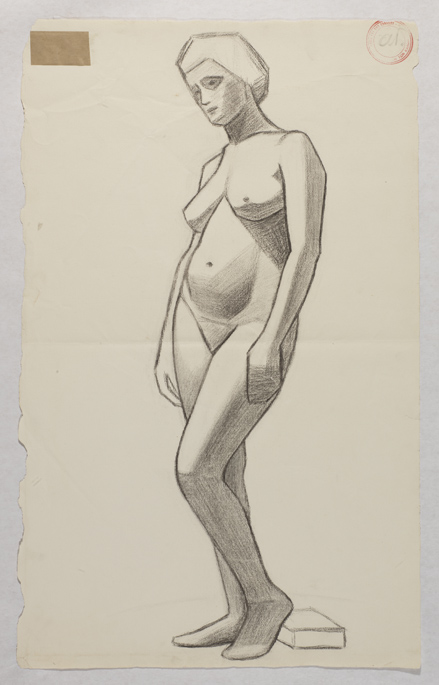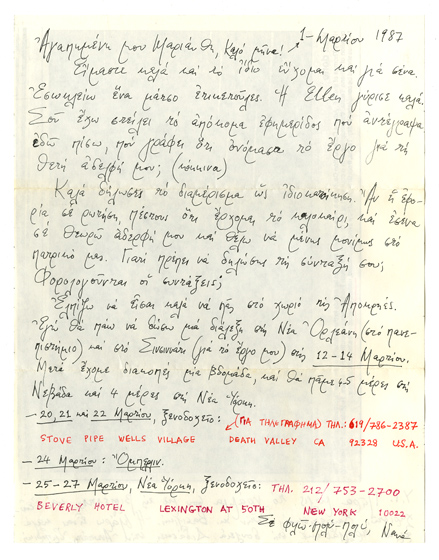(This blog post was co-authored by Digital Center of Americana II archives intern, Kyriakoula Micha.)
Athena Tacha is a Greek American sculptor, photographer, and conceptual artist who frequently works on large, public sculptures and spaces -- including Connections, at Franklin Town Park at 18th and Spring Garden in Philadelphia (seen below).
Her papers can be found in three different repositories: the Archives of American Art in Washington, D.C., the Oberlin College Archives in Oberlin, Ohio, and here at the Historical Society of Pennsylvania. The collection of her papers at HSP includes correspondence, early artwork, notes from college and graduate school classes, and photographs. Although the collection was created by Tacha, who settled in the United States in the 1960s, it is a valuable resource for an anthropological study of Greece from the 1940s to the present day.
The correspondence communicates an intimate view of the social and family relationships and the reality of the professional environment permeating the arts in the country. Aside from state jobs, there are limited career choices in Greece, especially for women artists – something Tacha elaborates on in her letters. It’s also important to note that part of the correspondence was written during a turbulent period of Greek history, the junta years, 1967-74. And because Tacha grew up in the aftermath of World War II and the civil war that followed, some letters serve as personal testimony to an obscure part of Greek history. Furthermore, the collection includes a lot of paperwork from her studies and scholarship which by itself gives information about institutional policies and culture.
The collection houses a copy of the weekly youth magazine of the early 1950s titled “The Treasure of the Children: the Little Greek.” Athena Tacha was a representative of the magazine in her hometown Larisa. Youths from various places in Greece contributed their poems and other writings to the magazine under pseudonyms (Tacha’s was “Red Arrow”). They also communicated with each other, writing letters and notes using their pseudonyms. The letters from these pen pals to a young Tacha paint a portrait of the youth culture of that era – the children’s values, code of contact, and thoughts about the adult world. Another interesting item in the collection is Athena Tacha’s mother’s year book from 1923. Pieced together and handwritten, it contains questions that people at that age often ponder about: what is love, what are you going to name your children, etc. (It seems like a combination of writing in a yearbook and the modern American game M.A.S.H.). Her schoolmates wrote down their answers, revealing in the process their thoughts and observations.
Since the letters trace Ms. Tacha’s life from childhood, they offer a panoramic view of her life and work as both were unfolding. To the foreground are the close family and social ties, so unique and particular to Greek culture: the intensity of the bonds formed between parents and children, siblings, and relatives close and distant, and life-long friendships. The letters also demonstrate the social rules of Greek culture, like gift giving, honoring name days and births -- all social “musts” which one has to uphold. Another cultural value present in the letters is the expectation that children will stay close to home mentally and emotionally, no matter how geographically distant they are. And on the other side of this value is the urge to break free from the firm hold of the family, although this urge is fed by guilt and fear. This collection also shows the drive and dedication of Tacha as a young artist to get established and furthermore to see her pieces realized. She met and forged friendships with important figures on Modern Art, many of whom are represented in the correspondence. These letters are an especially valuable source about the lives of Ellen Johnson and Pavlos Mylonas in particular.
Due to the intimate nature of the correspondence there are some deeply personal details of her life, which will be of interest to a future biographer. Throughout the letters her personality and character is vividly revealed, which is what – to those of us who worked with this collection – makes it so valuable.
Selected images from the Athena Tacha papers (3518) have been digitized and are available on our Digital Library. The finding aid for this collection is also available online.




